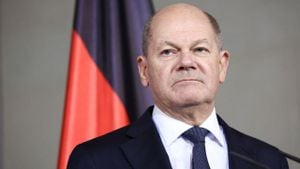The Verona City Council is embroiled in a heated debate concerning rising safety concerns and urban degradation, spurred on by vocal opposition groups demanding urgent action. A press conference held recently at Palazzo Barbieri brought together representatives from multiple political factions, including Paolo Rossi (Verona Domani), Patrizia Bisinella (Fare), Luigi Pisa (Forza Italia), Antonio Lella and Anna Bertaia (Lista Tosi), and others, who expressed alarm over the city's deteriorated condition.
The focal point of their criticisms was the presence of caravans and campers parked dangerously near the Borgo Trento hospital. "Are they going to pay for their parking just like the citizens of Verona?" quipped the center-right representatives, questioning the apparent double standards of local regulations. Rossi called for the administration to put its foot down against such breaches of public order, insisting, “The city cannot tolerate any form of anarchism. The urban police regulations must be enforced, and the parking fees should be duly paid. Residents and visitors alike must feel safe inside and outside the hospital. This requires decisive action from Mayor Tommasi's administration.”
Bisinella echoed these sentiments, decrying what she termed as unprecedented degradation, citing instances of illegal occupancy of private properties by migrants and rampant property damage. “We see vandalized benches, disgusting litter, poorly maintained streets, and even the return of window-cleaners at every crossroad. Is this the Verona we want?” she lamented, reflecting growing frustration among the public.
Luigi Pisa of Forza Italia emphasized the crumbling state of the roads, highlighting the nightly vandalism targeting vehicles and perilous potholes posing threats to pedestrians, cyclists, and particularly the elderly. “Walking the streets has become dangerous,” he warned, instigated by deep potholes and reckless scooter rides. “One might falter at every corner due to these dangerous conditions.”
Concerns about safety and aesthetic decrepitude were shared by Antonio Lella from Lista Tosi. He articulated three urgent needs: enhanced street cleaning, closer maintenance attention, and heightened public safety. According to him, the government must have a more pronounced listening ear for its citizens.
Luca Mascanzoni of Fratelli d’Italia underpinned the severity of the local safety predicament, stating, “Microcrime rates are climbing, and Verona bears the grim title of having the highest rate of such offenses within Veneto. Theft and vandalism are constant threats, and the local police force should serve as both deterrent and protector. Unfortunately, the current administration appears to be underutilizing this resource. The excuse of lacking manpower cannot overshadow politically driven decisions.”
Adding to the narrative, Barbara Tosi shared her experiences as property manager, noting the surge of residents requesting surveillance cameras, grilles, and improved lighting over the past two years. “It’s clear; residents are feeling increasingly unsafe within their homes.”
The opposition groups unitedly pushed for immediate actions, demanding structural measures from Mayor Tommasi, who they accuse of downplaying Verona's pressing issues. Their requirements revolve around ensuring public safety, urban decorum, and maintenance to prevent the city from slipping toward irreversible decay.
Following their criticisms, city administration's response came from Security Councillor Stefania Zivelonghi, who claimed, “There is no emergency” concerning the camper situation and maintained they were being monitored properly. She responded to Rossi's assertions, affirming, “The campers parked were within designated spaces, not violating any rules yet.” The regulator backed the police’s routine checks but recognized the need for improvement.
During the meeting, council discussions extended to various urban matters, featuring deliberations around new waste collection strategies and road maintenance. Specific initiatives are reportedly underway, promising to allocate significant funds for road repairs, addressing prolonged traffic issues, and enhancing community environments.
While some council members have acknowledged the issues, others, including members within Tommasi’s administration, like Sergio Tonni, reassured the public of their responsive stance to security concerns, citing instances of prior interactions with law enforcement and subsequent plans to tackle them.
Skepticism remains high among opposition groups, who argue their repeated calls for action have largely fallen on deaf ears. The challenging reality for Verona reflects growing anxieties concerning urban safety, maintenance, and respect for municipal laws, urging the administration to pivot from rhetoric to tangible results.
The opposition insists it is time to shift from dialogue to decisive action, advocating for systematic reforms highlighting the importance of security, cleanliness, and community engagement. Without addressing these issues head-on, Verona risks deepening its crisis, exposing residents to more dangers and distress.



